Planning a Move?
Let's Stay in Touch. Sign up for Touchdown Highlights
About
Services
Consultations
Knowledge Hub
Contact
Knowledge Hub
The best places to live
Published
September 19
2025
Lifestyle & Safety
Reviewed by Experts

Published
September 19
2025
Choosing the best places to live in Portugal is often the first, and most exciting, step in planning your move. With its sunny climate, rich culture, and welcoming communities, Portugal has become one of the top destinations for expats worldwide. Lisbon draws professionals and creatives with its cosmopolitan lifestyle, Porto offers a balance of tradition and modern energy, and the Algarve is renowned for its coastal beauty and relaxed pace.
With so many appealing options, deciding where to live in Portugal comes down to your priorities. Some expats value access to international schools and career opportunities, others prefer smaller towns with strong community ties, while many are drawn to the year-round sunshine of Portugal’s coastal areas.
This article explores the leading cities and regions, highlights what makes each appealing, and gives you practical insights to help you make a confident, well-informed choice for your new life abroad.
Before exploring specific cities and regions, it helps to apply a simple framework. Portugal offers a wide range of lifestyles, but finding the right fit means weighing your personal goals against practical considerations.
Decide if your priority is city buzz, coastal calm, or countryside quiet. Urban areas deliver nightlife, cultural events, and walkability, while smaller towns and villages focus on family-friendly living and a slower pace. Public transit and everyday convenience also vary widely across regions.
Housing costs shift dramatically across the country. Lisbon and Cascais are at the premium end, Porto and Coimbra are more affordable, and the Algarve is seasonal, with prices rising in the summer months. Madeira and the Azores can offer value, but long-term rentals may be harder to find.
Airport access can make or break your location choice. Portugal’s main international hubs are in Lisbon, Porto, Faro, Funchal, and Ponta Delgada. High-speed rail connects Lisbon and Porto, and most urban centers have reliable fiber internet, a key draw for remote workers.
For families, access to international schools is a major factor. The strongest clusters are in Lisbon/Cascais/Oeiras, Porto, and parts of the Algarve. Family-friendly neighborhoods also offer green spaces, sports clubs, and community organizations that make settling in easier.
Northern Portugal is greener, cooler, and wetter, while the south enjoys more sunshine and warmer weather year-round. The Atlantic coast brings breezy conditions, and inland regions can see intense summer heat. It’s also important to be mindful of wildfire and peak summer.
Your choice of location can influence your visa pathway. To see which option fits your situation, you can use Touchdown’s free Eligibility Checker, which gives you clarity on visa routes and requirements in just a few minutes.
English is widely spoken in Lisbon, Cascais, Porto, and much of the Algarve, but everyday life is smoother with some Portuguese. Expats often gravitate toward urban and coastal hubs with established communities, while rural areas may require more language immersion and local connection.
We reviewed Portugal’s most popular destinations for expats and highlighted the cities and regions that consistently stand out.
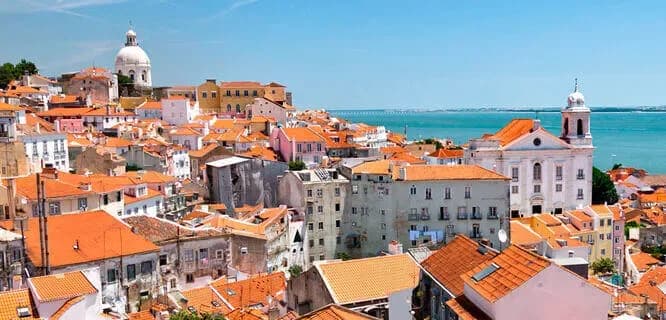
Source: TripAdvisor
Lisbon offers expats a capital city that feels international yet approachable. Winters are mild, summers are hot, and Humberto Delgado Airport connects you quickly to the rest of Europe. Beaches like Cascais and Costa da Caparica are close by, and the city has strong healthcare services and many international schools.
For professionals and digital nomads, Lisbon provides reliable internet, plenty of coworking spaces, and regular networking meetups.
Housing can be competitive in the center, so many expats choose areas such as Oeiras or Almada for more space and value. Lisbon is also one of the most LGBTQ+ friendly cities in Europe, with Príncipe Real and Bairro Alto known for inclusive nightlife and cafés.
English is widely spoken, but learning some Portuguese will make daily life easier.
For more guidance, visit the Lisbon City Hall website.
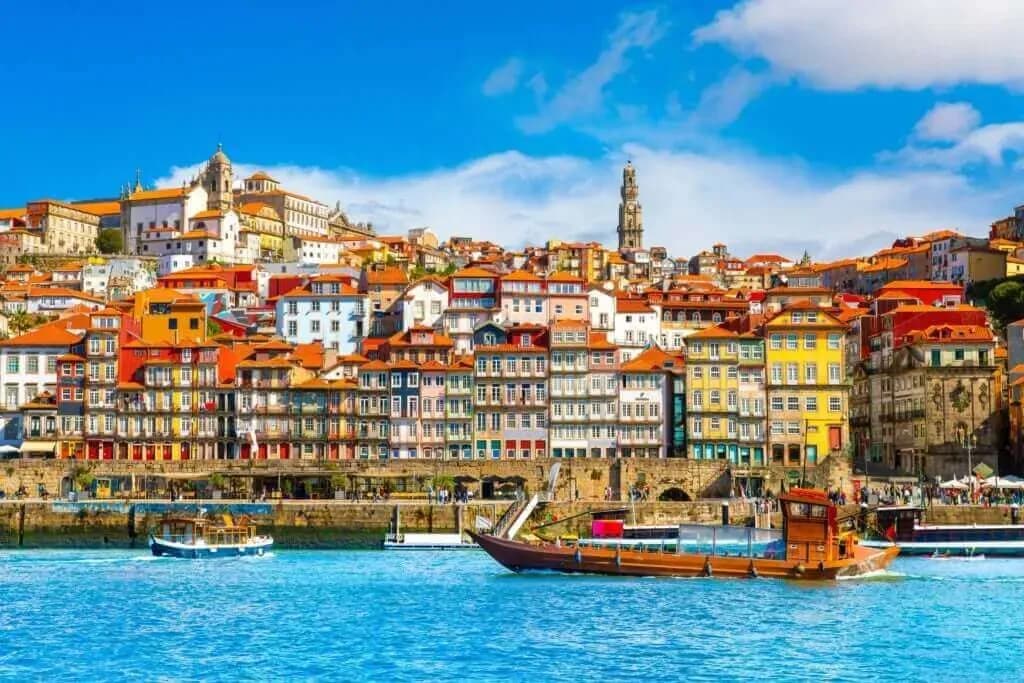
Source: Business Standard
is Portugal’s second-largest city and sits on the Douro River, famous for its port wine and UNESCO-listed historic center. The city has a lively cultural scene, excellent food, and a warm, welcoming atmosphere that makes it easy for newcomers to settle in.
English is widely spoken, healthcare services are strong, and the local airport connects you easily with Europe and beyond. Many expats appreciate that Porto feels cosmopolitan yet more affordable than Lisbon, while still offering beautiful beaches and vibrant city life.
Living in Porto does come with cooler, wetter winters, but the trade-off is a city rich in charm and community. Housing costs are climbing in the historic center, so expats often look to quieter neighborhoods or suburbs for better value and more space.
The city’s growing expat community, active job market, and laid-back lifestyle continue to attract professionals, families, and retirees alike.
More details can be found on the Porto City Hall website.
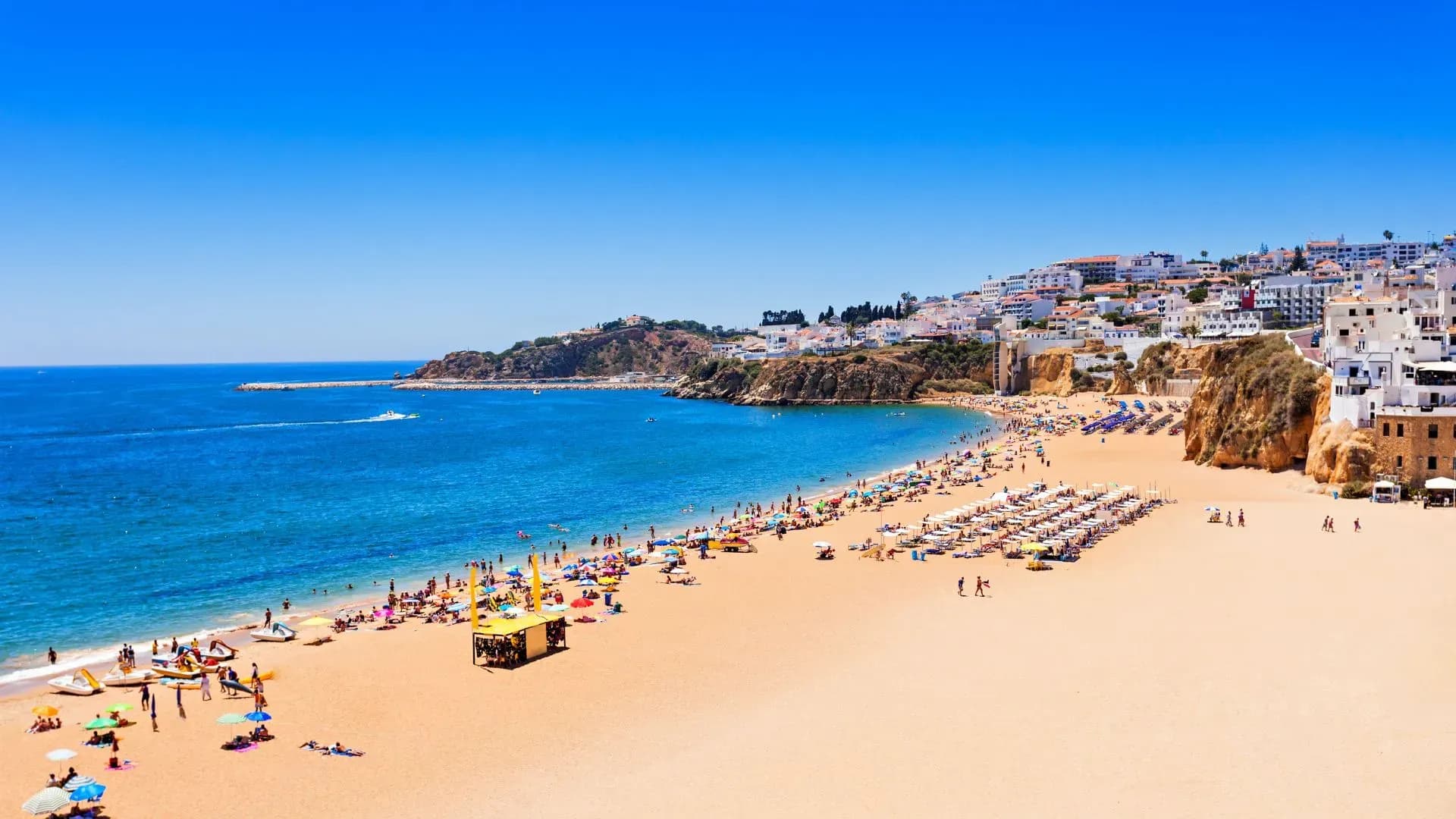
Source: The Real Algarve
The Algarve, in southern Portugal, is famous for its 300 days of sunshine, golden beaches, and laid-back coastal lifestyle. Expats are drawn here for the lower cost of living compared to much of Western Europe, as well as excellent healthcare and solid infrastructure.
English is widely spoken, especially in coastal towns, which makes settling in easier for newcomers. Affordability, natural beauty, and modern services has made the Algarve one of the most popular destinations for retirees, families, and remote workers.
Different areas of the Algarve offer distinct lifestyles. Lagos is loved for its scenic cliffs and active expat scene, Tavira is quieter and full of charm, Faro provides urban convenience and an international airport, while Albufeira and Carvoeiro attract those who enjoy resort living. Many expats explore inland villages for more traditional Portuguese life at a lower cost.
For more details, visit Visit Algarve.
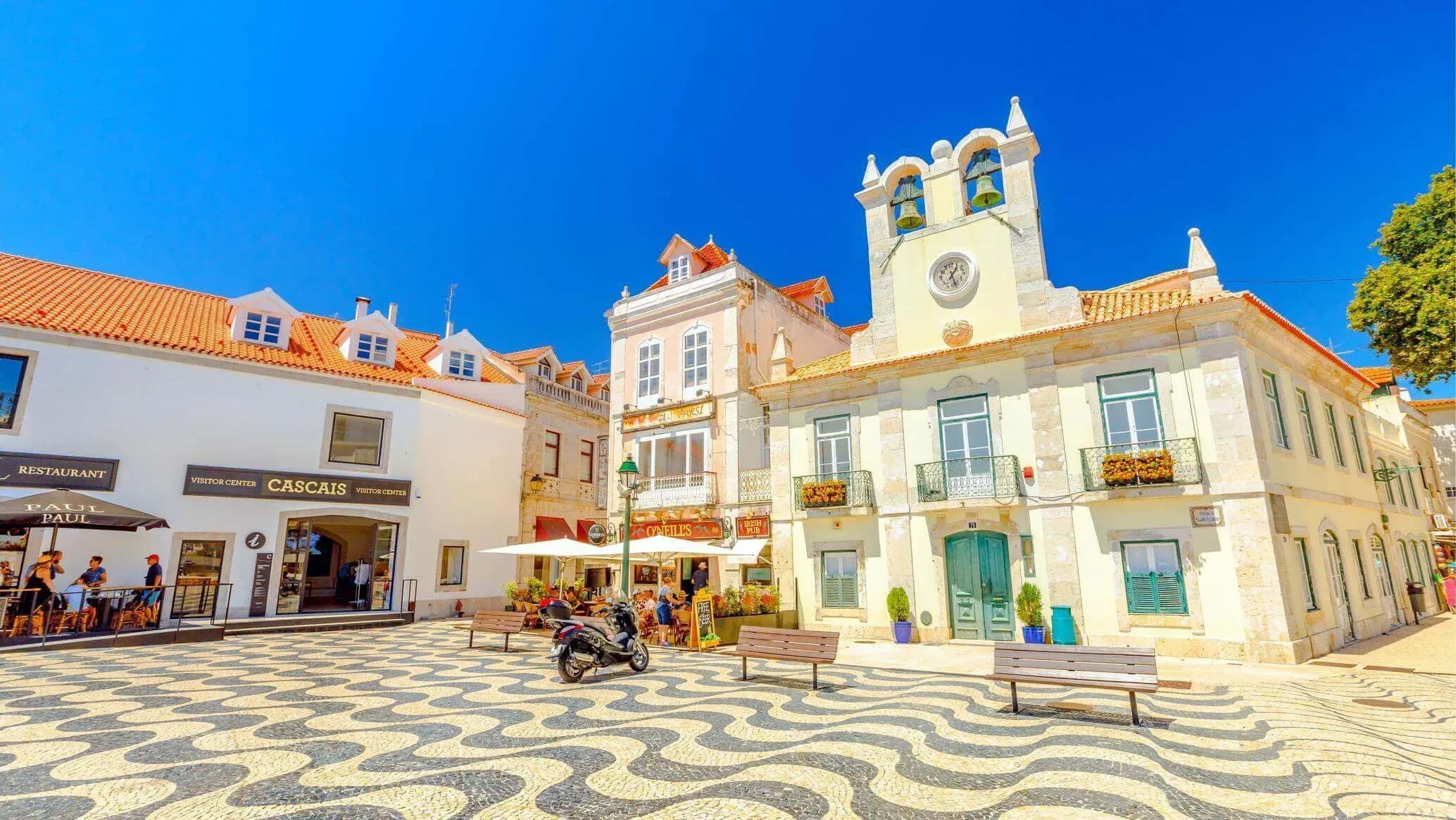
Source: Planet of Hotels
Cascais is a seaside town just west of Lisbon, popular for its sandy beaches, marina, and outdoor lifestyle. Many expats choose Cascais for its mild climate, walkable streets, and relaxed pace of life, making it a strong option for families and retirees who want the benefits of a smaller city without giving up proximity to Lisbon.
The town also has private healthcare options that are highly rated, with English-speaking staff, as well as several international schools, including the International Christian School of Cascais, St Julian's School and the International Preparatory School.
Families appreciate the safe neighborhoods and education options, while digital nomads and professionals enjoy strong infrastructure and a lively but residential environment. Cascais does get crowded in peak summer, which can affect housing and daily life, but many see this as a small trade-off for year-round seaside living.
For more information, see the Cascais Municipality website.
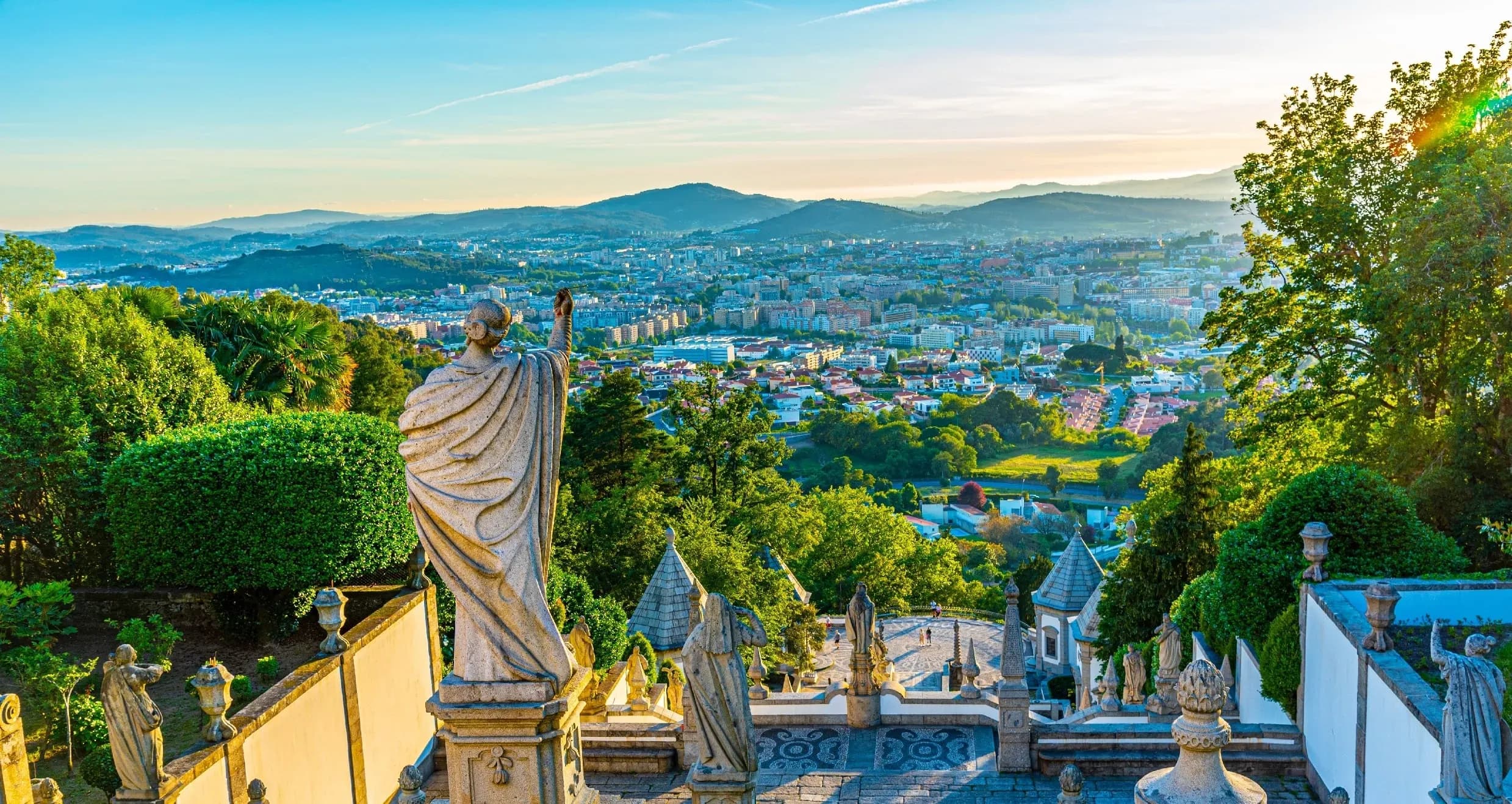
Source: Wikivoyage
Braga, Portugal’s third-largest city, is one of the oldest in the country and offers a unique mix of historic charm and modern opportunity. Landmarks like the Bom Jesus do Monte sanctuary and centuries-old churches showcase its religious heritage, while tech companies, shopping centers, and universities keep the city forward-looking. Braga stands out as one of the most affordable cities in Portugal, making it appealing for families, retirees, and young professionals alike.
Expats moving to Braga will find excellent schools such as Colégio D. Diogo de Sousa, reliable healthcare at Hospital de Braga, and a growing real estate market. Properties in the historic center are limited, but neighborhoods near the Universidade do Minho or in the northern quarter offer more options at reasonable prices.
Many expats also look to surrounding towns and villages for larger homes with land, though these may require renovation. For culture, business, and affordability in northern Portugal, Braga is an attractive base with a strong sense of community.
Learn more on the Braga City Council website.
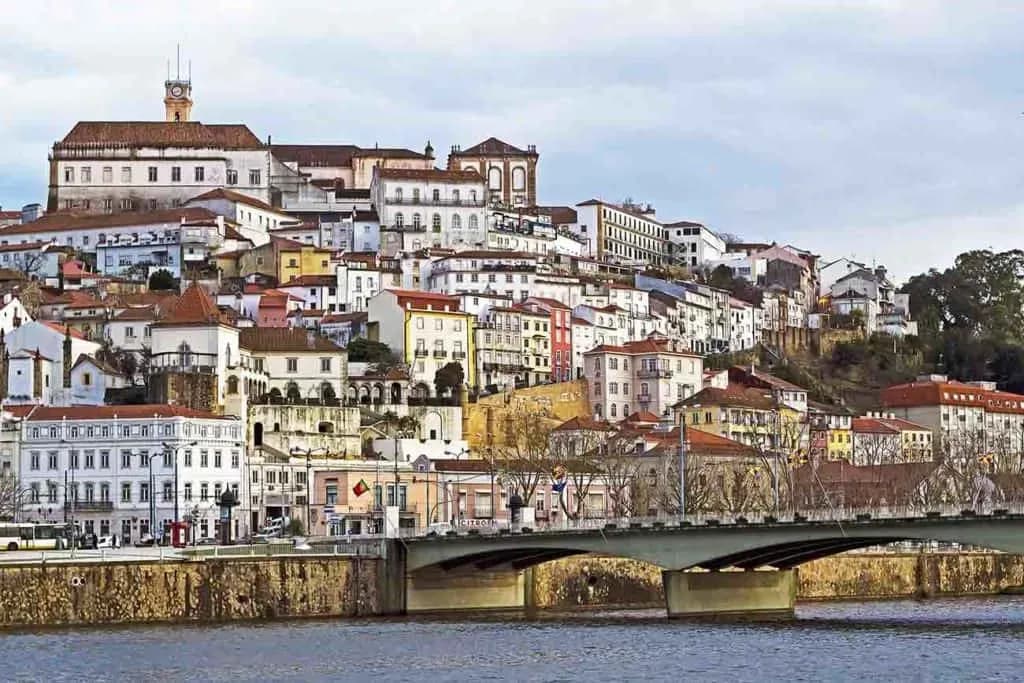
Source: Portugaltravelguide
Coimbra is a central Portuguese city that combines historic character with the comfort of modern living. The hilltop old town is filled with narrow cobbled streets and centuries-old architecture, while the lower town hums with shops, cafés, and restaurants.
Home to the University of Coimbra, one of the oldest in Europe, the city has a lively, international atmosphere without losing its strong Portuguese identity. With a lower cost of living than Lisbon or Porto, Coimbra appeals to retirees, families, and young professionals seeking both affordability and culture.
Housing is easier to find than in larger cities, though properties around the university are often aimed at students. Expats often choose neighborhoods just outside the center or in surrounding villages for larger homes and more space, sometimes at renovation prices.
Its location between Lisbon and Porto, plus quick access to the Atlantic coast, makes Coimbra a convenient base for travel. For those looking for cultural immersion alongside modern amenities, it remains one of Portugal’s most appealing options.
More details are available at Visit Coimbra.
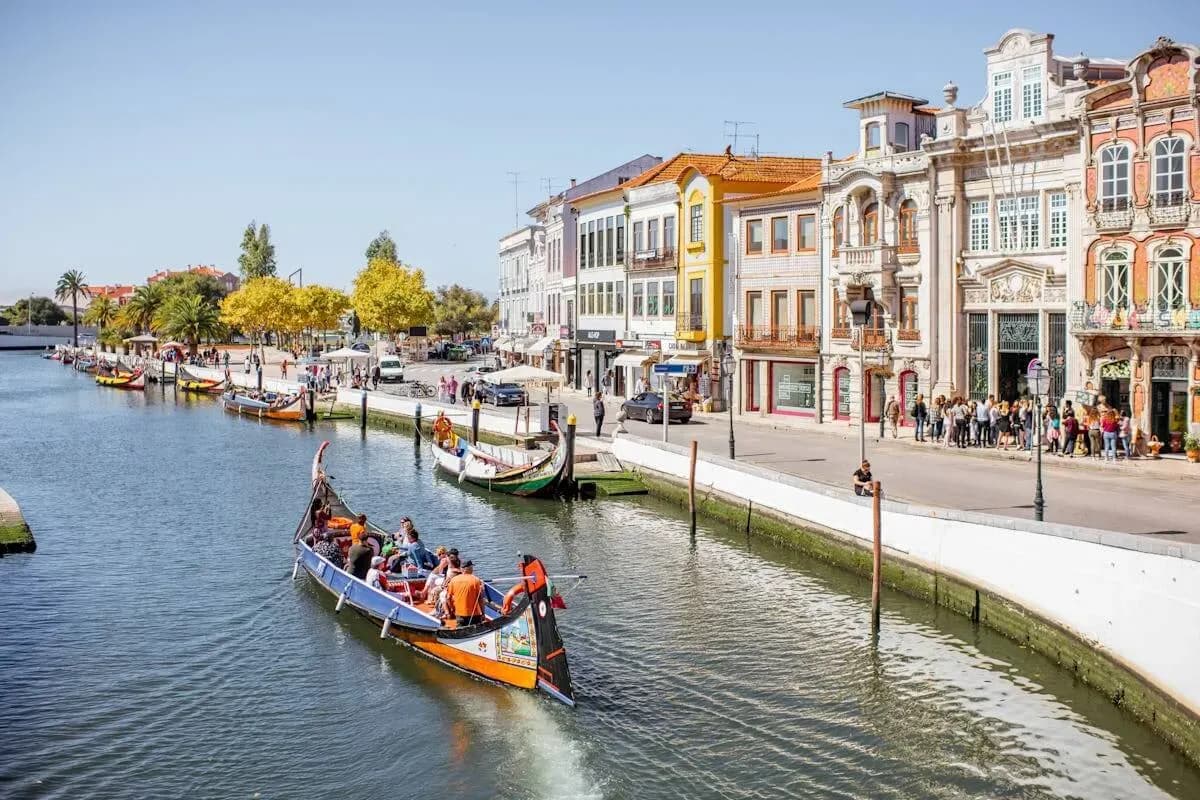
Source: Postshopsave
Aveiro, often called the “Venice of Portugal,” is a picturesque city known for its colorful canals, moliceiro boats, and distinctive Art Nouveau architecture. Its compact size, affordability, and mild climate make it attractive to retirees, families, and expats who prefer a quieter pace than Lisbon or Porto without giving up modern amenities.
The city has undergone thoughtful modernization with more pedestrian-friendly areas and bike paths, creating a relaxed, community-focused lifestyle.
For daily life, Aveiro offers cozy cafés, shopping malls, lively markets, and cultural events such as the Aveiro Sweet Festival. The local housing market is strong, with apartments popular in the city center and good-value properties near the university or on the outskirts.
Expats will find a welcoming international community, friendly locals, and quality healthcare and education options nearby.
Learn more at the Aveiro Municipality website.
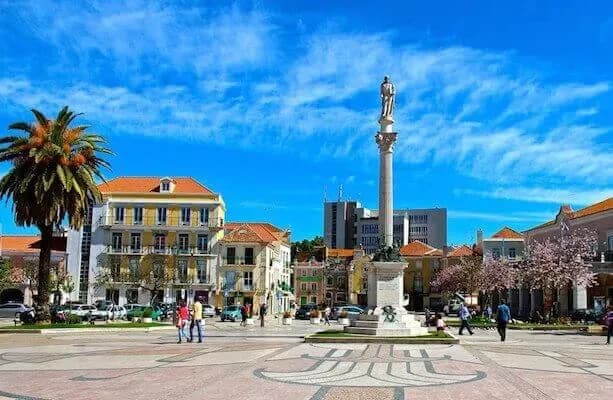
Source: Devour Tours
Setúbal, a port city just south of Lisbon, combines maritime heritage with a relaxed coastal lifestyle. Known for its sardine industry, sweet Moscatel wine, and lively food markets, the city has an authentic character that appeals to both locals and expats.
With a lower cost of living than Lisbon or the Algarve, Setúbal is gaining popularity among those who want affordability without giving up access to culture and services.
Retirees are drawn to the city’s leisure facilities and seaside vibe, while professionals appreciate the short commute to Lisbon and the chance to enjoy a quieter daily life.
Expats who prefer even more tranquility often choose the small towns surrounding Setúbal, where larger homes and land are common. For those seeking a mix of authenticity, natural beauty, and convenience, Setúbal offers an appealing alternative to Portugal’s better-known destinations.
Learn more at the Setúbal Municipality website.
As you can see, Portugal is far more than just Lisbon, Porto, and the Algarve. Whether you are a remote worker seeking a coastal base, a retiree looking for peace in the countryside, or a family that thrives on city life, there is a place in Portugal that feels like home.
The “Big Three” deserve their reputation, but exploring beyond the obvious often reveals hidden gems that offer just as much charm, community, and opportunity.
Expats in Portugal benefit from vibrant, supportive networks that provide professional advice, social connections, and local insights.
Here’s a list of active communities you can join:
Joining an expat community in Portugal can make the relocation process far easier and more enjoyable.
These groups provide social support by helping newcomers build friendships, join local meetups, and connect with others who understand the challenges of starting fresh abroad.
Touchdown is Portugal’s leading relocation platform. Backed by a team of expert lawyers, we simplify the entire relocation journey by providing everything you need to set up and thrive in your new home through an integrated, easy-to-use platform.
We understand that every move is unique, so whether you’re relocating solo or with family, Touchdown is designed to create a plan around your goals and needs. Our free Eligibility Checker identifies your criteria within minutes, and we combine our in-house legal expertise with a platform that gives you full visibility and step-by-step guidance.
From handling your visa application to structuring your tax setup and supporting you after you land, Touchdown transforms complex immigration processes into a smooth, stress-free experience.
Here’s how Touchdown helps at every stage of your relocation:
Our free Eligibility Checker quickly identifies which visa options you qualify for, such as the D7 or D8. From there, we schedule a one-on-one consultation with our legal team to build a plan around your goals and timeline.
We make sure every document is in order, from proof of income to accommodation contracts and certified translations. Our lawyers review everything line by line and guide you through consulate appointments so your application process stays on track.
Each client works with a dedicated lawyer who provides personal support throughout the process. You’ll have expert guidance from the moment you apply for your visa through to residency and even citizenship if that’s your long-term plan.
We arrange your Portuguese tax number (NIF) and help open a local bank account, both essential for renting property, paying bills, and establishing financial residency.
Our legal experts assess your personal situation and advise on how to benefit from regimes like IFICI (NHR 2.0). This ensures you’re structured in the most tax-efficient way from day one.
Our work doesn’t stop once your visa is approved. We support you with AIMA appointments, lease reviews, NIF updates, and getting set up with healthcare, schools, and ongoing tax compliance.
Ready to find your place in Portugal? Use our free Eligibility Checker or book a 1:1 consultation with our team to start planning your move today.
That depends on what you’re looking for. Many expats choose Lisbon for its culture and jobs, Cascais for family-friendly coastal living, Porto for its charm, and the Algarve for sunshine and retirement communities.
The largest American communities are in Lisbon, Cascais, Porto, and the Algarve (particularly Lagos, Tavira, and Faro). These areas offer English-speaking services, international schools, and well-established expat networks.
Yes, especially in Lisbon, Cascais, Porto, and the Algarve, where English is widely spoken in daily life. Learning basic Portuguese, however, will make integration smoother and help in smaller towns or official settings.
The cost of living in Portugal is lower than in the United States. Dining out, healthcare, and public transport are especially affordable compared to U.S. prices. Housing can be costly in Lisbon and parts of the Algarve, but mid-sized cities such as Coimbra, Braga, and Aveiro are far more budget-friendly.
For most people, yes. The overall cost of living, including food, healthcare, and utilities, is lower than in major U.S. cities. That said, imported goods and cars can be more expensive in Portugal.
Most expats settle in Lisbon, Porto, and the Algarve, as these regions have strong infrastructure, international schools, and established expat communities. Growing numbers are also choosing Braga, Coimbra, and Aveiro for their lower costs and authentic lifestyle.

Author Bio
Henrique Moreira de Sousa
Henrique leads Immigration at Touchdown. Henrique is a Portuguese Lawyer and immigration law specialist that has overseen the relocation of hundreds of expats to Portugal.
Related Articles
Related Articles
Let's Stay in Touch. Sign up for Touchdown Highlights
